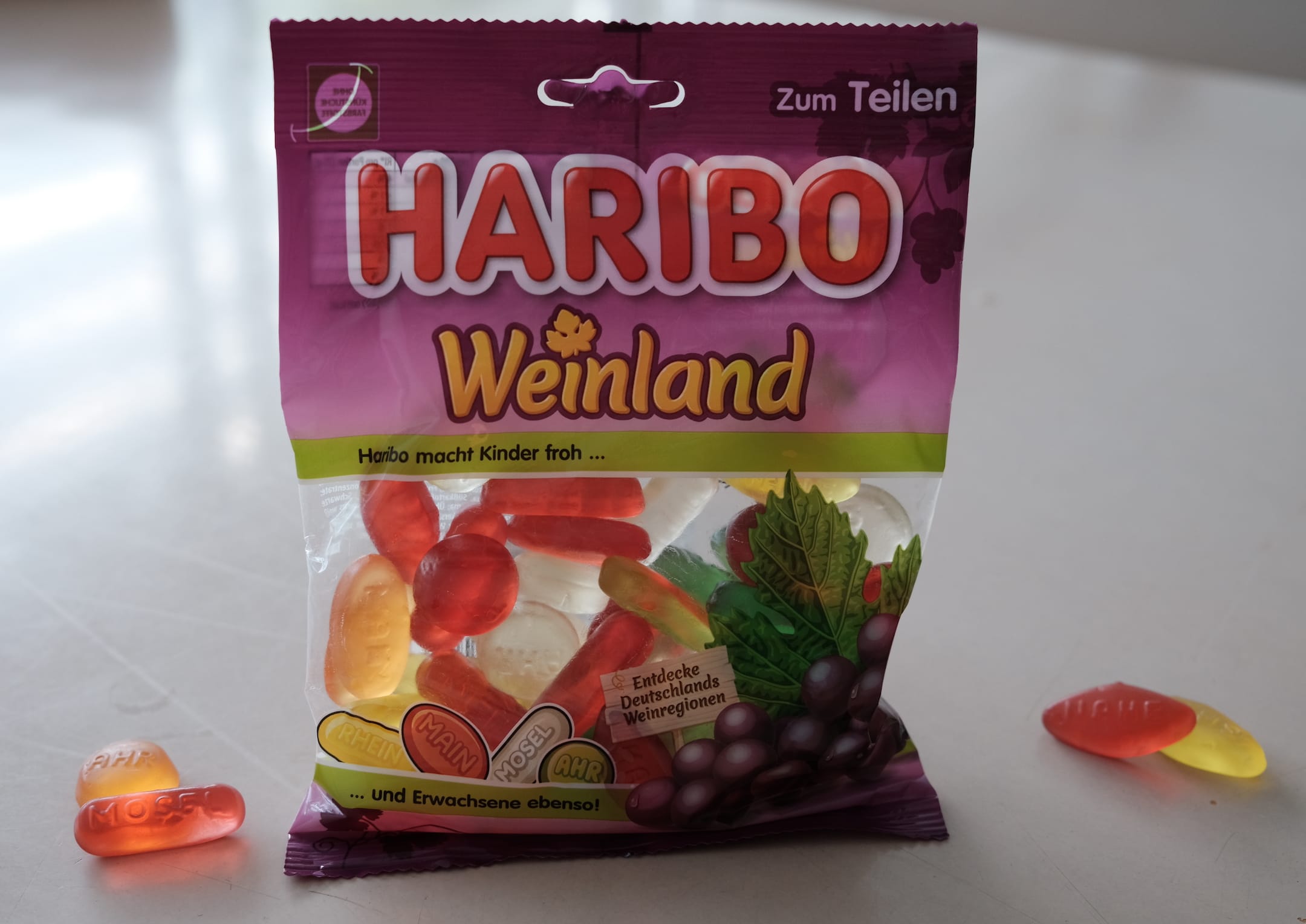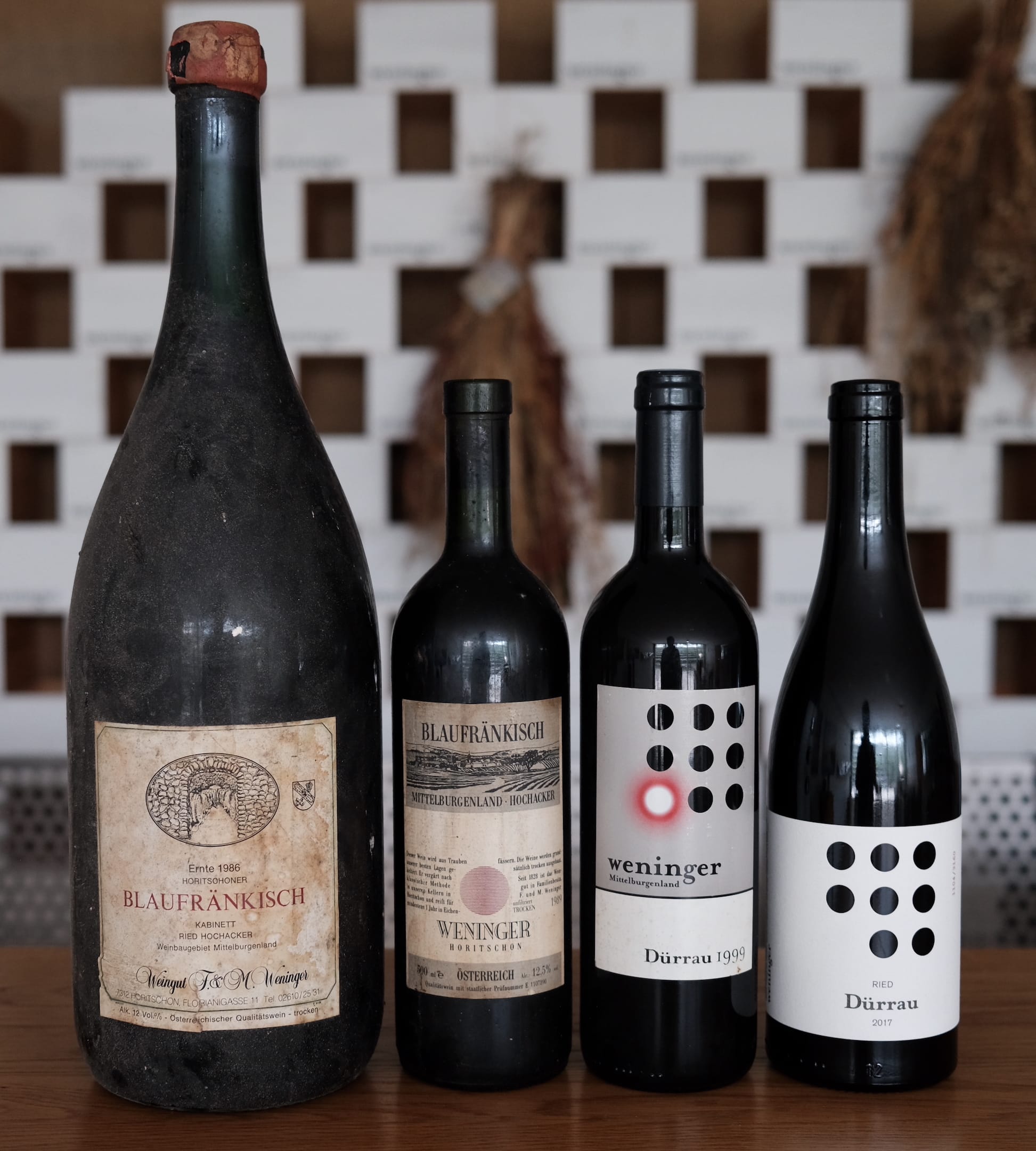The stolen origin
Written by Franz Weninger on the 1st of September 2022How did it happen that industrial wine production (and also food industry) may use the designation of origin on the label, but craft wines cannot state where they’re made? About the importance of this issue for the future of our wine culture.
Haribo Weinland, a fine selection!
From the Ahr to the Moselle to the Rhine - thanks to the imprinted river names, Weinland is a small wine journey in bag format. The finish is pleasantly fruity with pronounced notes of pineapple, strawberry, raspberry, orange and lemon. Cheers!

Ingredients: Glucose syrup; sugar; gelatin; dextrose; acidifier: citric acid; fruit and plant concentrates: safflower, apple, radish, spirulina, sweet potato, carrot, lemon, black currant, hibiscus; wine; flavor; glazing agents: beeswax white and yellow, carnauba wax; invert sugar syrup. May contain traces of milk, wheat.
The time had come once again: we sent our top vineyard wines Dürrau and Kalkofen 2019 to the Federal Office of Viticulture in Eisenstadt. In order to be allowed to write the vineyard names on the label, we have to apply for a state test number for the wines.
After the tasting by the Federal Office - the disillusionment: granting of the state test number refused. Reason: sensory examination showed "faulty, unharmonious, untypical".
Just as every person has an origin, so does every wine.
As so often, the same game. We work certified organic and biodynamic in the vineyards. We only process grapes from our vineyards which we own and care for decades. We can therefore ensure 100% that the grapes for Dürrau, for example, have also grown on this particular site. In the cellar we then try to bring exactly the specific taste of this site and the soil, into the wine. And for us, that means one thing above all: omitting. No selected yeasts, no overpowering wood flavor, no fining agents, no filtration. All this to bring the pure taste of the vineyard into the bottle.
And then, after years of work, a tasting panel decides that this wine does not taste typical for the site. Therefore, we are not allowed to write the name of the vineyard on the label. Not even the place or region name may be mentioned, the smallest geographical unit in our this case is a fantasy name called "Weinland" (for wines from the Burgenland region). It is very alarming for us that we observe this development not only in Austria, but also in Hungary. There, in case of rejected tasting, it is even actually impossible to put the wine on the market, because the lower quality level "Landwein" or "Wine from Hungary" simply does not exist.
What happened in Austria that this tasting no longer works?
About 35 years ago, when the strictest wine law was introduced in Austria, we had a large number of individual wines. Wine tasted like the cellar of the winemaker, the place where it was grown, and now and then like the grape variety. Wine was an artisanal product. Selected yeasts were invented only in the 1980s, and other additives in the cellar did not exist except for sulfur.
Because at that time a large part of the wines submitted to the test panel tasted this way, these wines also came through the tasting. And were allowed to use there origin at the label. Why not now?
In Burgenland we have observed that more than twenty years have passed between the arrival of modern oenology and its large-scale use. But today it has become standard to use industrial yeast, yeast nutrients, enzymes, bacteria and tannins in winemaking. In the meantime, the great mass of wines submitted are made in this way (with additives) and thus it is a different situation for the tasters. Wines that are not industrially produced stand out. This is enough to cause the uncertainty of the tasters, and reject the wines.
Natural flavor is now unknown flavor.
In France, we see that many of the wines we find most exciting have a simple "Vin de France" designation of origin on the label. But not from all regions. In small regions where there are many peasant winemakers (Beaujolais, Burgundy, Jura), this tasting panel still works. In regions where wine is industrialized (south of France), it no longer works.
This leads to a sad conclusion: Austria is becoming an industrial wine nation, and unfortunately, so is Hungary.
Why are fermented milk and fermented vegetables (e.g. sauerkraut) allowed to smell of the fermentation process, but fermented grapes must smell of fruit?
To illustrate this more figuratively, we go from fermented grape juice to fermented milk. Cheese was created like wine. Milk spoiled and thus became durable. The spoilage was cultivated over thousands of years. Thus, depending on the region and the feed of the animals, different types of cheese were created. In the storage it happened that cheese began to mold - so blue mold, red smear and many other types of cheese were created. It was only because these coincidences were allowed to happen that new types of cheese were created.
If in Austria only the industrialized type of wine production (made with selected yeast, filtration, sulfur) is allowed, wine culture will not develop further, and the diversity will decrease.
Many Austrian winemakers have turned their backs on the test number - all producers who are internationally appreciated and recognized and enjoyed in the bestr restaurants in the world, but according to the Austrian quality control they are not producing quality wines which would be allowed to use origin.
We too have been asking ourselves this question for some years now, especially since in our family wines have always been designated by their origin.

We have no other choice. We will continue to produce wines that bear their origin in themselves, even if they may no longer bear it on the label.
To all winemakers who reach out to me and asked what we could do against this, my suggestion: do not send your wines to these tastings anymore. If more and more wines of Weinland, Steirerland or Bergland are served by the best sommeliers in the world, the local government will have more pressure to stop this nonsensical tasting. So that the responsible citizens (in that the EU believes) have a choice again to taste origin and place in different interpretations.